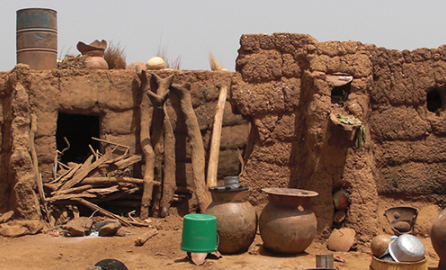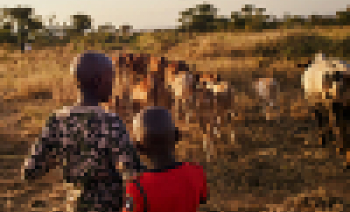Burkina Faso’s population is set to double within 20 years, bringing a host of development challenges. Head of EU Cooperation Thierry Barbé discusses how the EU is supporting the government on areas from green energy to justice, and reflects on regional cooperation on resilience through the EU Trust Fund for Africa.
Capacity4dev (C4D): What are the main development challenges in Burkina Faso, and what are the key areas of EU cooperation?
Thierry Barbé (TB): The main challenge is demographic: in ten years’ time there will be something like 30 million people, whereas today there are less than 20 million. Within 20 years the population will double, but the country’s economic growth and capacity to drive that are not enough, and that will mean challenges of security and of poverty. The government is keen to address these issues properly.
We are involved through various instruments in many different fields: water and sanitation, health and demographic control, food security and nutrition, agriculture, justice, decentralisation, human rights and civil society. We are involved in security, energy and transport - both the governance of the transport sector and the rehabilitation of the main roads. We work on employment and resilience, refugees and migration. It would be easier to just tell you where we’re not working – that’s education.
These sectors are in a National Indicative Programme agreed with the government, funded through Budget Support. Each Budget Support programme also combines civil society support and technical assistance to provide capacity building.
In the following video Thierry Barbé speaks about the role of civil society in Burkina Faso
C4D: How do you work at a regional level, and how could it be better coordinated?
TB: It’s difficult to cooperate on regional issues because there are so many different arrangements. There’s a lot to do. We are in charge of part of the regional cooperation for West Africa, something like 40%, whereas Abuja [the EU Delegation to Nigeria] is responsible for the other 60%. We‘ve tried to make this cooperation more effective than it was by either finding implementing partners that are able to act in various countries, or by giving responsibilities to the national authorities for implementing their part of the regional programme. That’s the new trend; we’ll see if it works. It’s relatively new, but in a way it’s comparable to what is happening in Europe where most of the programmes are carried out and implemented by the national authorities.
An important area for regional cooperation in the Sahel is resilience. In Burkina Faso we’ve had good reactions from the government, and we’ve been working with ECHO [the European Commission’s humanitarian aid arm], with our partners, and with the government on three important areas of resilience. These are water and sanitation, including access to water in difficult areas; nutrition together with food security, which means addressing the root causes and the consequences of malnutrition, acute and chronic. And of course health, where there is a particular focus on increasing access to health for children under five.
What we have proposed is to combine our instruments for these fields both through the Trust Fund, through Budget Support and through civil society support. I think so far it has been quite successful in having the government take more responsibility for these issues and vulnerabilities. What I particularly appreciate about cooperation in Burkina Faso is that by principle it is a combination of Budget Support and civil society support, so somehow our policy dialogue is helping the country build its policies and reforms from these two strands of cooperation.
Security is a new field of intervention in Burkina Faso. The authorities have a little experience in collaboration and coordinating partners in this field. It is truly a new challenge both for the partners and for authorities.
C4D: What’s your experience of the EU Trust Fund for Africa, and how is it seen by partners?
TB: It’s fast – of course, but still too slow, but comparatively faster than other ways of working. We like the speed, we like the frontier atmosphere, we like the fact that we are inventing a way of working. A few projects on resilience, employment and traineeship, security and governance along the borders with Mali and Niger, are in their early phases, with NGOs and partners working where vulnerability and insecurity prevail.
On the other hand it’s difficult to have the authorities properly taking care of these projects, because they are prepared in an atmosphere of emergency. It has to be decided for this date, and contracted for that date. The authorities are used to taking co-responsibility for our cooperation in the context of the European Development Fund, with NAOs or national authorising officers. They tend to look at the cooperation in the context of the Trust Fund with suspicious eyes, and we’re doing our best to improve our Faithfull cooperation at all the various steps.
C4D: What’s been your experience with blending – leveraging EU aid with other funding?
TB: On green energy we are involved in the biggest solar plant in West Africa - a 33 megawatt plant in Zagtouli, which is quite substantial. We are the contracting agent with the government; it’s funded through a combination of a grant from the EU for 50% and a loan from the French Development Agency mechanism.
We are also using blending for a water plant to double the provision of drinkable water to the capital city of Ouagadougou. We have been working with blending instruments on the electric interconnection with Ghana. Later, we will do the same with Nigeria and Niger.
The two challenges for blending are to maintain visibility and to be a part, although you are a junior partner, of the policy dialogue.
C4D: What do you see as the main challenges for colleagues in the Delegation?
TB: We are involved in so many places with so many instruments; every week I discover a piece of action that is taking place in my country that I was not aware of. It is generally financed through multi-country interventions or through regional interventions. It’s overwhelming.
Besides too many sectors, and too many instruments, the real challenge for the cooperation sector is for staff to adapt to the new working atmosphere, to new working directions. More and more, cooperation is a component of political or policy dialogue. That was already the case with Budget Support, but now we also have to use this framework with the other instruments. It's actually not possible to have a proper policy dialogue with all the sectors.
C4D: Could you draw any lessons from projects which have gone well, or otherwise?
TB: We’ve had an incredibly successful project in the justice sector. I say "incredibly" because I have seen many projects in the justice sector that have been unsuccessful, thanks to political resistance or resistance from the judiciary.
This project was implemented during the unrest and after the so-called insurrection or uprising [protests sparked in 2014 which led to the overthrow of President Compaoré]. There was a huge appetite for improving the usefulness of the justice system, its effectiveness and its efficiency. The government tried to foster reforms. For a while the judiciary themselves changed their behaviour and adapted their systems.
If I have to draw a lesson from that, I would say that it doesn‘t depend on us. It depends on the political will and on the capacity of a profession, say the doctors or the judges, to change their behaviour in the new context.
C4D: What role did the EU play? And how has the justice system changed?
TB: We found good experts to work on the project and committed - members of that administration who were willing to conduct the reform, and that was very useful. We also did a lot politically to support the reform in this sector with involvement from the Head of Delegation and high-level people from Brussels, including the Commissioner.
We also included strong elements of reform of the justice sector in Budget Support operations. Finally our support came through a strong policy or political dialogue combined with, financial involvement through project and technical assistance. The so-called conditions (i.e. objectives) regarding the justice sector within our Budget Support programmes are quite helpful. We were able to benefit from the high demand for transparency within the administration and from their stakeholders, and we’ve done a lot to improve that together with the authorities.
For citizens, the result is more access to justice, less time spent in prison, better filing systems, more independence of the judiciary, independence from the political sector - though not so much from the economic sector. We have strong indicators showing that improvement is taking place for citizens.





Log in with your EU Login account to post or comment on the platform.